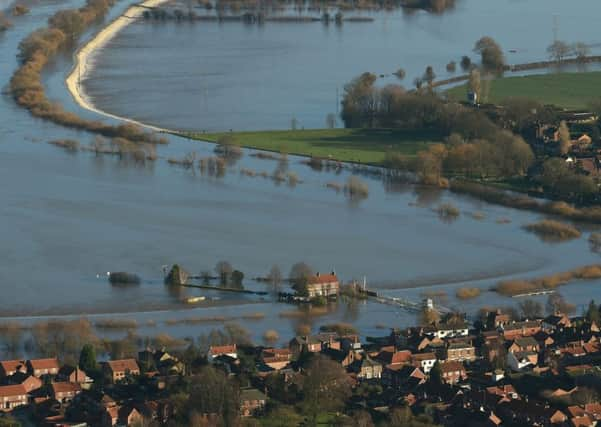Tom Richmond: If not now, when? Time to turn devolution tide following floods


I refer not to the Government’s grudging response to the Yorkshire floods, and the “drip, drip, drip” of announcements to appease victims, but whether this region’s political and business leaders will now seize the moment over devolution.
If ever there was a prima facie case for decisions being taken by a directly-elected Yorkshire mayor rather than a London-based Minister, it has been the floods.
Advertisement
Hide AdAdvertisement
Hide AdThough this region’s Tory MPs have rallied to the defence of David Cameron and Elizabeth Truss, the beleaguered Environment Secretary, this blind loyalty overlooks the fact that all those caught up in this disaster have been let down by successive governments who have failed to invest sufficient sums in adequate flood defences – whether this be major capital projects or the day-to-day maintenance of rivers.
The Government prioritised a major upgrade of the Thames Valley’s flood defences over a long-term scheme for Leeds; it has been economical with the truth over its funding commitments; it had to be embarrassed into making extra money available and it took 10 days to stump up £3.3m to repair Tadcaster’s road bridge and provide a temporary foot crossing for a town split in two.
And it does not end here. The focus on Leeds, Tadcaster and York, where recriminations continue to grow over the failed Foss flood barrier totally neglects the Calder Valley where towns like Hebden Bridge, Todmorden and Mytholmroyd have been virtually ignored by the powers-that-be, and where funding has still to be signed off to repair Elland Bridge for example.
These, for the record, are towns where residents endure a living hell because the floods have been so frequent, and where homeowners are still waiting for Mr Cameron to fully honour the promises that he made during a fleeting visit in the summer of 2012.
Advertisement
Hide AdAdvertisement
Hide AdThis frustration was summed up by Leeds Council leader Judith Blake who said that the Leeds City Region would have “very different flood defences and public transport in place by now” if “local people had been in charge of these areas of public spending over the last two decades”.
She could be right, but her assertion does need to be qualified on two fronts. First, it assumes there would have been sufficient money – locally and nationally – to pay for flood prevention schemes. The money has to come from somewhere.
Second, there is a presumption that town halls could have delivered such projects on time and on budget when there are so many competing demands on the public purse. If responsibility for flood defences was exercised locally, it would depend on Government funding and mayoral powers.
Yet, despite this, it is imperative that councils in West, North and East Yorkshire not only join forces, but they also agree a streamlined leadership structure – headed by a Boris Johnston-style elected mayor – which delivers results rather than create convoluted tiers for the benefit of career bureaucrats.
Advertisement
Hide AdAdvertisement
Hide AdGiven it is nearly a year since George Osborne paved the way for Manchester, and the rest of the North, to have the type of freedoms enjoyed by London, Scotland and Wales, it is ominous that this is the only region not to reach a settlement after councils in Sheffield and South Yorkshire opted to team up with their counterparts in North Nottinghamshire and North Derbyshire.
Though negotiations were never going to be easy because this county’s economy and geography is so diverse, and because Labour politicians in this region’s urban heartlands have very different views to their Tory counterparts who are in the ascendancy in York and more rural areas, perhaps there was an element of truth when David Cameron said: “We just thought people in Yorkshire hated everyone else, we didn’t realise they hated each other so much.”
If this is the Prime Minister’s lasting impression of God’s own county, it’s even more imperative for Yorkshire’s leaders to prove the PM wrong. After all, dominant issues like flooding, transport, skills training, economic investment and the NHS all transcend local government boundaries. Even though the worst of the floods have been in areas which form part of the Leeds City Region, they have been portrayed as the “Yorkshire floods” because this is an iconic county.
Given the priceless nature of the “Yorkshire” brand, it now needs to be utilised to the hilt so this area – still lagging behind the rest of the UK on may key economic indicators – can fulfil its potential as an economic powerhouse. Do local leaders really want Yorkshire to be eclipsed by rival regions like Greater Manchester where politicians are working together? I thought not.
Advertisement
Hide AdAdvertisement
Hide AdThis brings me back to my original question: If not now, when? For, if Yorkshire did have a powerful mayor who was able to champion the interests of the whole county and who was respected by national politicians, the Government would not have been allowed to treat this region’s residents as second class citizens when it comes to protecting those communities now on the flooding frontline.